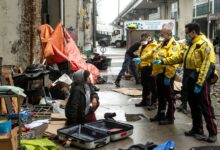‘We are in utter disbelief’: northwestern Ontario First Nation mourning 5 deaths in house fire
People in Kitchenuhmaykoosib Inninuwug, also known as Big Trout Lake First Nation in northwestern Ontario, are mourning the deaths of five people in a house fire Thursday morning.
“We are in utter disbelief as every community member is connected and impacted,” Chief Donny Morris stated in a written release on Thursday. “Today our community mourns this tragic loss.”
Morris expressed his “sincere condolences.”
Kitchenuhmaykoosib Inninuwug (KI) is located approximately 600 kilometres north of Thunder Bay.
Morris told CBC News in an interview Thursday afternoon that he was notified of the fire at around 5:00 that morning, adding that police were waiting for the fire marshal to “verify what happened.”
“It was a private residence with a single mom with her kids,” he said. “Four children and one single parent.”
“Everybody is affected,” Morris continued, adding that the First Nation is a small, tight-knit community.
“Especially when it comes down to kids, that’s the hard part — when you know that these kids won’t grow up and were lost tragically.”
The First Nation not having proper firefighting equipment, including hydrants with enough pressure, combined with the presence of old houses in the community were all challenges to fighting Thursday’s fire, according to the chief.
“Losing one whole family, that’s unbearable.”
Latest tragic fire
The deadly blaze in KI comes just over three years after a fire in Pikangikum — another northwestern Ontario First Nation — killed nine, including a baby and two young children. Other First Nations in the region that have experienced fires in recent years that killed multiple people also include Wunnumin Lake and Mishkeegogamang.
Those fires, along with another 2016 blaze in Oneida First Nation near London, Ont., prompted Ontario’s chief coroner to launch an expert review into why house fires in First Nations so often become tragedies, calling the number of deaths on-reserve “disproportionate.”
A 2010 federal study found that First Nations people living on reserve are 10 times more likely to die in a house fire than the rest of Canada.
First Nations leaders, including NAN Grand Chief Alvin Fiddler, have pointed to a number of issues affecting Indigenous communities, including inadequate housing, unsafe building standards, lack of enforcement of building codes and outdated or ineffective fire suppression equipment.
In KI, Morris said he didn’t yet know details Thursday afternoon like what caused the fire or if the home had a working smoke alarm.
“I need the fire marshal and the investigation unit to give me these [answers],” he said, adding that others were hurt trying to rescue the family during the fire.
The identities of the deceased have not yet been released and more information is expected as additional details become available, according to Thursday’s statement.
“On behalf of the community, all I can ask for is prayers … because I can’t take back what happened,” Morris added.
He said “good samaritans” from other area First Nations, including Bearskin Lake, Kasabonika Lake and Muskrat Dam, as well as help from non-Indigenous communities, is expected to come to KI “to show support and offer their help.”








Redes Sociais - Comentários